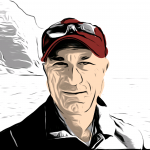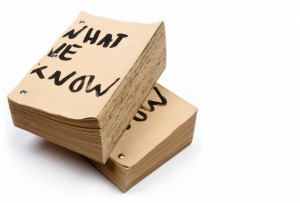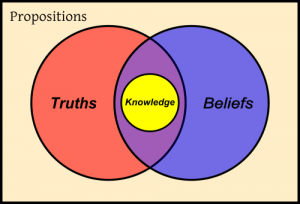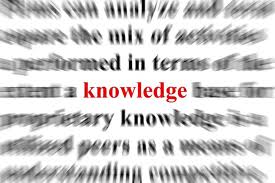 Philosophers spend a lot of time wondering and worrying about questions like: what CAN we know?, what DO we know?, and how do we KNOW what we know?; so much so that an entire branch of philosophy, known as epistemology, deals with these and related questions about knowledge, and what exactly knowledge might be. Epistemological philosophers have also had a lot of fun categorizing different forms of knowledge, such as distinguishing “knowing that” from “knowing how.”
Philosophers spend a lot of time wondering and worrying about questions like: what CAN we know?, what DO we know?, and how do we KNOW what we know?; so much so that an entire branch of philosophy, known as epistemology, deals with these and related questions about knowledge, and what exactly knowledge might be. Epistemological philosophers have also had a lot of fun categorizing different forms of knowledge, such as distinguishing “knowing that” from “knowing how.”
 My first encounter with the distinction between knowing how and knowing that came courtesy of my good friend and philosophical mentor James Wilk, who introduced me to Gilbert Ryle and his famous work, The Concept of Mind, where, in Chapter 3, Professor Ryle provides a brilliant, plain language exposition on the How and the What of Knowing How and Knowing What (my description, not Ryle’s). A rather clever, and much briefer, explanation of this distinction can be found in Personal Knowledge, by Michael Polanyi, who uses the example of the act of balance involved in riding a bicycle, suggesting that the theoretical knowledge of the physics involved in maintaining a state of balance can’t substitute for the practical knowledge of how to ride a bike, and that it is important to understand how both are established and grounded.
My first encounter with the distinction between knowing how and knowing that came courtesy of my good friend and philosophical mentor James Wilk, who introduced me to Gilbert Ryle and his famous work, The Concept of Mind, where, in Chapter 3, Professor Ryle provides a brilliant, plain language exposition on the How and the What of Knowing How and Knowing What (my description, not Ryle’s). A rather clever, and much briefer, explanation of this distinction can be found in Personal Knowledge, by Michael Polanyi, who uses the example of the act of balance involved in riding a bicycle, suggesting that the theoretical knowledge of the physics involved in maintaining a state of balance can’t substitute for the practical knowledge of how to ride a bike, and that it is important to understand how both are established and grounded.
 Of course, the idea that we can know something, leads inevitably to the notion that there must be some category of things that we know, ergo, we have knowledge. Plato is said to have defined knowledge as “justified true belief.” The Euler diagram to the left attempts to depict the concept. For any proposition to qualify as knowledge, it has to be true (the red circle represents all true propositions), you have to believe the proposition to be true (the blue circle represents all propositions you believe to be true), and you have to be justified in your belief that the proposition is true (the yellow circle represents the subset of believed truths where the belief is justified.
Of course, the idea that we can know something, leads inevitably to the notion that there must be some category of things that we know, ergo, we have knowledge. Plato is said to have defined knowledge as “justified true belief.” The Euler diagram to the left attempts to depict the concept. For any proposition to qualify as knowledge, it has to be true (the red circle represents all true propositions), you have to believe the proposition to be true (the blue circle represents all propositions you believe to be true), and you have to be justified in your belief that the proposition is true (the yellow circle represents the subset of believed truths where the belief is justified.
Unfortunately, no single agreed upon definition or theory of knowledge exists. This quote from Bertrand Russell‘s “Theory of Knowledge” sheds some light on the difficulty in defining knowledge:
“The question how knowledge should be defined is perhaps the most important and difficult … This may seem surprising: at first sight it might be thought that knowledge might be defined as belief which is in agreement with the facts. The trouble is that no one knows what a belief is, no one knows what a fact is, and no one knows what sort of agreement between them would make a belief true.”
 Not to put too sharp of a point on the pencil, let me simply take a break here and note that these are B-I-G questions, and that philosophers have struggled with them for almost as long as people have been able to walk on the earth without spending every waking minute either looking for their next meal or trying to avoid being some hungry critter’s next meal; and they will still be arguing about the same questions when our Sun explodes into supernova and smashes our planet and everything on it into dust particles that drift to the outer reaches of our galaxy.
Not to put too sharp of a point on the pencil, let me simply take a break here and note that these are B-I-G questions, and that philosophers have struggled with them for almost as long as people have been able to walk on the earth without spending every waking minute either looking for their next meal or trying to avoid being some hungry critter’s next meal; and they will still be arguing about the same questions when our Sun explodes into supernova and smashes our planet and everything on it into dust particles that drift to the outer reaches of our galaxy.
Today, I’m much more interested in what we don’t know about ourselves, and more specifically, how we can be so clueless about what we don’t know about ourselves.
Nearly everyone is aware of the problem. I wrote in an earlier post, “What Is It About A$$holes?, that an integral part of the definition of an asshole is the inability/unwillingness to recognize the defect. In a more tragic context, many people with mental illness or brain injuries deny that they are ill, and refuse treatment. This goes far beyond what most of us understand as the psychological concept of denial–a refusal to believe an uncomfortable truth. We all know a heavy drinker, eater, smoker, or drug user who says, “I can quit any time I want.”
But this special type of cluelessness–the medical term is an obscure word, anosognosia, which is pronounced “uh-no-sog-no-zha,” and loosely translated from the Greek means “unawareness of illness”–is quite different. It is not simply denial of a problem, illness or defect, but a genuine inability to recognize that a problem, illness or defect exists. It is a common consequence of brain injuries, and occurs to varying degrees in disorders like schizophrenia, bipolar disorder, and Alzheimer’s disease.
Someone who has anosognosia isn’t being difficult, or refusing to face the truth. She is literally unable to believe that her illness is, in fact, an illness. It is a form of self-deception, perhaps neurologically induced, but a self deception nonetheless.
 Back to current reality, the story about Notre Dame football player Manti Te’o and his “fictional” girlfriend certainly appears to have some markers of self-deception. When you read about the young linebacker’s story, you can’t help but wonder, “How could he be so clueless?”
Back to current reality, the story about Notre Dame football player Manti Te’o and his “fictional” girlfriend certainly appears to have some markers of self-deception. When you read about the young linebacker’s story, you can’t help but wonder, “How could he be so clueless?”
I’ll have more to say about cluelessness in the next installment of this essay on Cluelessness: What We Don’t Know.
Amen! Cluelessness abounds in our society today. From Notre Dame to the hallowed halls of Congress, there’s plenty of cluelessness to go around. Good article and observations.